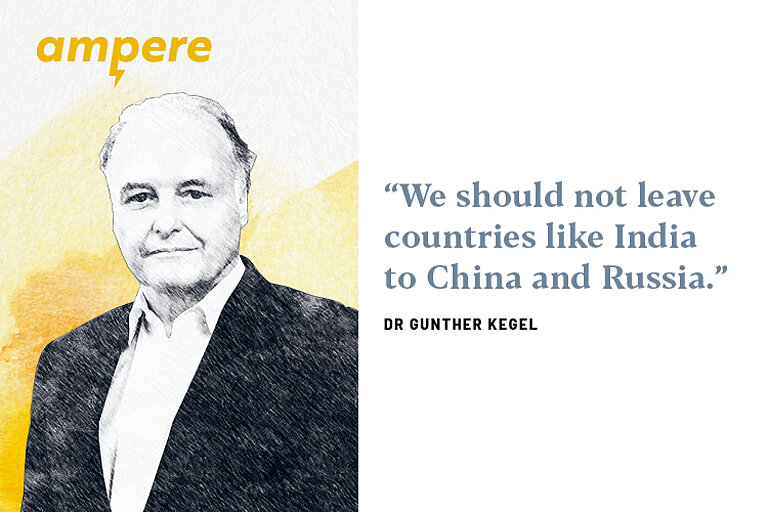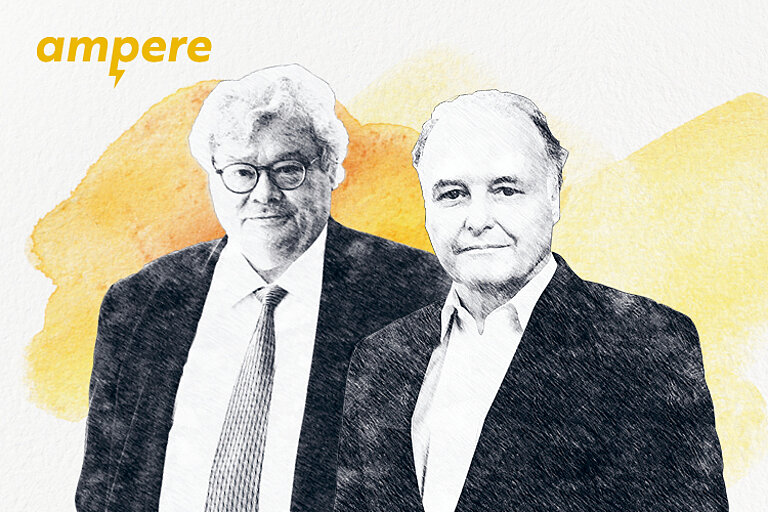Publications
European Affairs
08.05.2024
"We need to make a better offer!"
The geopolitical environment and sprawling bureaucracy are challenging Europe. Reinhard Bütikofer, Member of the European Parliament, and ZVEI President Dr Gunther Kegel talk about the state of the EU and its future prospects in an ampere interview.

Mr Bütikofer, you are leaving the European Parliament after 15 years. How have the EU and the geopolitical environment changed during this time?
Bütikofer: Today, the EU is facing a challenge that hardly anyone would have expected 15 years ago. We believed that the multilateral, western democratic system was firmly established. Instead, there have been fundamental shifts that have also affected the openness of markets. That is why Europe needs to start a new era – and I would say that we are already in the thick of it. This applies to both industrial and foreign policy. Everything is currently being reorganised.
How can Europe exert any influence at all if its global significance – for example economically – continues to decline?
Bütikofer: Regarding foreign relations, we should adopt something like a guiding principle that has proven its worth within the community, and that is strength through cooperation. We need to cooperate even more closely with countries such as Japan, Australia, Mexico and Canada, which are close to us on many fundamental issues. Unfortunately, however, there is the ominous idea of “strategic autonomy” in Europe – as if it were desirable for the EU to act particularly zealous and often as if it were an autonomous entity. I think that is wrong, because we need “strategic cooperation”. With our sometimes arrogant attitude towards potential partners, we have given China and Russia far too much space. We must make a better offer than these authoritarian powers!
Dr Kegel, what do you see as the biggest challenges for the EU?
Kegel: I have been working in the economy for around 35 years now. During this time, globalisation has been a prerequisite for economic success. But it has also been a good thing from a humanitarian point of view. As a result, it has lifted more people out of abject poverty than ever before. Unfortunately, since Russia’s invasion of Ukraine, we have been on the path to a power-based political approach. That is highly dangerous. After all, an export nation like Germany, but also Europe as a whole, needs peaceful coexistence, partnerships on an equal footing and rule-based structures. The EU urgently needs to work on this.

How should the EU position itself in this new environment?
Kegel: We are in the middle of a process of change and we do not yet know where it will lead. What is certain is that we have to increase our own defence capabilities and can no longer rely on the Americans to come to our rescue – because they will no longer do that. Nevertheless, the mentioned “strategic autonomy” is not a solution either. Europe cannot survive with such a policy because we are too small.
Bütikofer: I believe that the transition to a power-based world is not yet complete. We can still help to prevent this from happening. In the UN Security Council, the Kenyan ambassador said the same thing: “We share Ukraine’s interest in ensuring that large states cannot force smaller neighbours to submit to their rule. As Africans, we are not directly affected – but if this approach prevails, there will be no more stability and peace in any other part of the world.” We must rely on such partners. We could cooperate with resource-rich countries in Africa and help them to develop their own processing industry, for example for rare earths. The EU is discussing this under the heading “Global Gateway Initiative”. The question, however, is whether everything will happen quickly enough.
Influence requires economic strength. Recently, however, we have heard more and more complaints that the EU has developed from a growth engine into a regulatory monster. Dr Kegel, how bad is the situation at the moment?
Kegel: Our single market is an incredible asset. However, it is now being overshadowed by a regulatory frenzy that reached new heights in the last legislative period. Five new legal acts await us on the topic of “data economy” alone! We are already grappling with the General Data Protection Regulation, which has its intellectual origins in the 1980s. In addition, there is a German Supply Chain Due Diligence Act, which is being replaced by a European Due Diligence Act and imposes unbelievable documentation obligations on us – this is a huge burden, especially for small and medium-sized companies.
What does this mean for the economy?
Kegel: At the company that I head, with around 1,800 employees in Germany, there are now ten people working on these compliance issues. We know from experience with the Dodd-Frank Act in the USA that this effort is disproportionate to the changes achieved. Nevertheless, the EU has based its regulation on this model.
So are there bureaucrats in Europe who think up regulations without weighing up their consequences?
Bütikofer: Despite all the justified criticism, we must be careful not to chase after the illusion that we could proceed without regulation. Markets arise from regulations and we have a toolbox for this in Europe. However, some tools are not included. With the Inflation Reduction Act, US President Biden has launched an ecological investment offensive that essentially utilises market-based instruments rather than regulatory law. This is not possible in the EU because the member states are responsible for this. If the EU wants to regulate something, it has to use other tools. However, I believe that the way regulations come about is antiquated. It would be more intelligent if the economy and society considered beforehand how the ecological aspects of the Green Deal, for example, can be used as a driving force for greater competitiveness.
To conclude, let us take a look into the future: How should the EU be organised in ten years’ time?
Bütikofer: There is one thing in particular that I would like to see: The EU should do more to partner with countries from the Global South. Otherwise these countries will become a mobilising force for authoritarian regimes. China’s propaganda says: “The West has colonised the whole world for centuries. We are the first non-Western nation to have succeeded in rising up. You must all support us – because when we have risen up, you will follow.” If we add fuel to the fire through our behaviour and do not treat these countries as partners, we should not be surprised about the consequences.
Kegel: I can only endorse that. I also hope that we will be further along in ten years’ time with the completion of the single market, for example in the areas of grid expansion, digitalisation and telecommunications. Because this will keep us attractive for potential partners. And we have to meet these partners with a compromise-led policy – and not with a policy of finger-pointing. The free trade agreement with India is a perfect example. We have the chance to do everything right here. However, there is also a danger that we want to enforce European standards that cannot be implemented there. We should not leave countries like India to China and Russia, but as a democratic continent we should endeavour to build partnerships with them.

